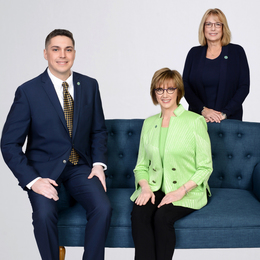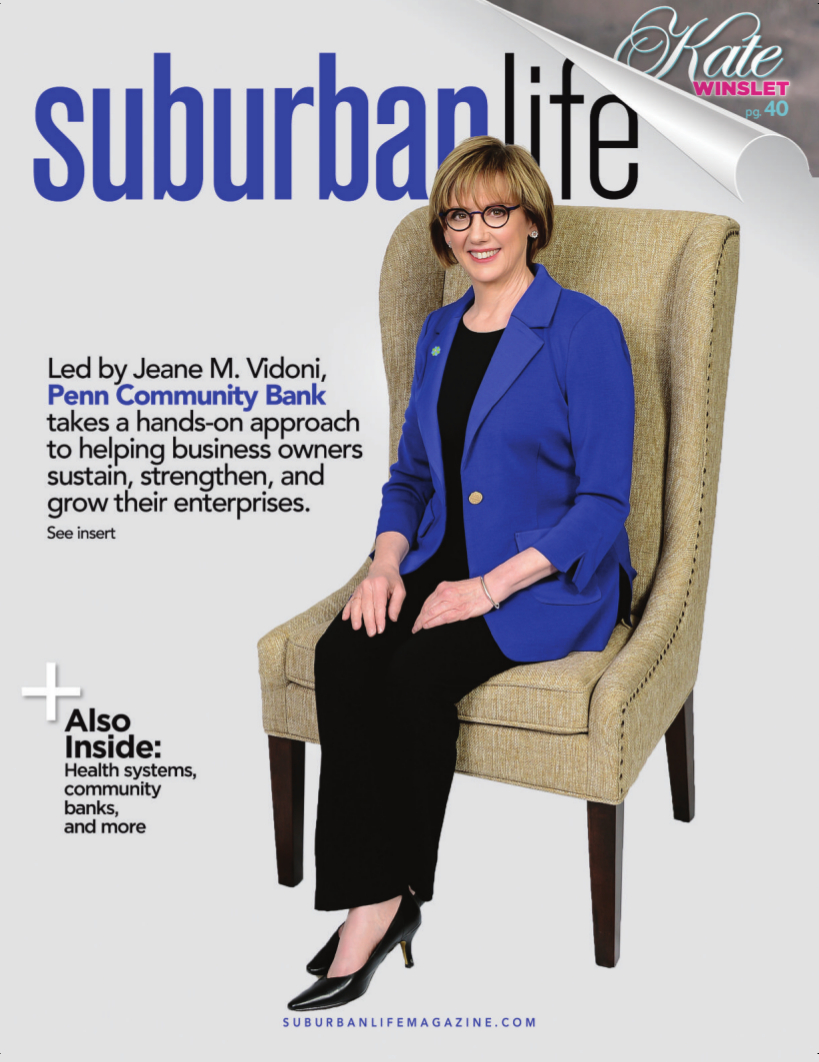
Business Growth Made Personal
Penn Community Bank takes a hands-on approach to helping business owners sustain, strengthen, and grow their enterprises.
“It’s nothing personal; it’s just business.”
Despite its frequent usage, James Li believes this turn of phrase has no place in his line of work. From his perspective, as Vice President - Team Leader of Commercial and Industrial Lending for Penn Community Bank, business is incredibly personal.
“If I’m not getting to know the customer on a personal level, I’m not doing my job,” says Li. “When I’m talking to a business owner about a potential deal, I want to get to know them as a person, because the numbers don’t tell the whole story. Yes, I want to know about their profitability and their business plan, but I also want to know their background, their history, and what’s important to them in their lives.”
In other words, he looks to build a relationship with the individual sitting across the desk or speaking on the other end of the phone. He then uses that understanding to see how he and his team can use the multiple tools at their disposal—business lines of credit, term loans, construction loans, real estate loans, and SBA loans, among others—to help that business owner sustain and grow the enterprise.
Li works closely with business owners of all sizes to determine the most appropriate methods to help them achieve their goals. One customer might need capital to invest in a growth opportunity. Another might want to purchase new equipment to expand the enterprise into new territory. Yet another might require funding to compete more effectively by renovating an existing space. No matter the need, Li approaches each interaction with openness, honesty, and directness.
“Someone might come to us looking for a loan to finance a deal, and if it’s not a good deal, I see it as my responsibility to tell them,” he says. “The customer wants to pay X, but based on the price and what I know about different businesses, I might suggest they may be overpaying a bit. They might not want to make the deal as a result, but they tend to appreciate it over time. Ultimately if it helps them, it also helps the community, and it helps us, too, because that kind of honesty earns trust.”
Making Connections
Penn Community Bank has become the largest mutual bank in eastern Pennsylvania, with more than $2.5 billion in assets, more than 300 employees, and 23 branches in Bucks and Montgomery counties. The Perkasie-based banking institution has been rooted in in the region for 150 years, having established itself as an integral part of the local economy and a pillar of the communities it serves.
“When you’ve been a part of the community for as long as we have, you learn about what growth means to businesses and families,” says Jeane M. Vidoni, President and CEO of Penn Community Bank. “These aren’t numbers on a spreadsheet. We know that the work we’re doing is impacting the local economy and establishing an environment where individuals and organizations can thrive. It’s this commitment to growth and personal relationships that drives everything we do.”
Penn Community Bank is built to “grow along with our customers,” as Li puts it.
“One of our competitive advantages is that, while we might be considered a community bank, we have the ability to do more for our business customers,” he adds. “We can lend substantial amounts to more customers, so we can keep doing business with our existing customers even if they keep getting bigger and bigger.”
Penn Community Bank prides itself on being a full-service provider of financial services. From Li’s perspective, the term full service means the bank takes a sincere interest in its customers and continues to offer solutions to the challenges those customers face, financially speaking.
“A lot of customers reach out to me in a consultative way, so in some ways I am a starting point for them,” he says. “If they need online banking, I can put them in touch with the right person to help them do that. If they need to start doing direct deposit for payroll, I can direct them to someone in cash management. If they need 401(k) advice, we have a wealth management team I can refer them to. Full service means we can make connections and offer all these great services to help them grow.”
Li came to the Philadelphia area by way of college. Born and raised in China, he moved to the United States at age 13 and settled in Pittsburgh with his family. He went to college at Temple University, where he majored in international business and finance. His background enables him to foster relationships with business owners of varying backgrounds—including those who speak Mandarin—though he’s just as likely to build a connection over his fondness for long-distance road biking.
Adam Pennicuik can relate. As Vice President - Cash Management Relationship Manager, Pennicuik likes the fact that his job enables him to learn about a customer’s business, but he also gets to know about other aspects of an individual’s life, such as family, interests, and pastimes. In turn, he’s likely to share his own passion for mountain biking, and maybe even recommend his favorite trails in nearby Tyler State Park and Nockamixon State Park.
“What we do is all relationship banking,” he says. “When I go out and meet with a customer, I will sit there and listen to what their needs are. I can see the stress on their face because of the challenges of their industry. I like being able to solve those problems and provide solutions, and see that stress being removed from their face. You hear relief in their voice, because whatever issue they may be having, they know I’m going to take care of it.”
Working Together
With each business owner he meets, Pennicuik aims to learn about their needs, goals, and challenges, and then provides them with workable solutions to keep the bottom line strong. Options may include direct-deposit payroll services, remote deposit capture, wire transfers, and targeted accounts designed to maximize a customer’s return on cash flow.
“Anything to do with payroll or staff tends to be a big stress point for business owners,” he says. “We offer a bunch of different solutions for payroll to give [business owners] more flexibility and transparency, and often we can help decrease the fees they may be paying. First, we’re going to see what they want to accomplish, and then we’re going to help them to the best of our ability.”
Originally from Australia, Pennicuik came to the United States six years ago, after meeting—and then marrying—an American woman who had been working in Australia on assignment. His more than 20 years of experience in financial services provided a solid foundation when he joined Penn Community Bank, though he says working for a community bank has been a wholly unique experience.
“Earlier in my career, I worked for larger banks, some with over 10,000 employees,” Pennicuik says. “Working for Penn Community Bank has been much different. I like getting out and seeing customers face to face, and learning about their businesses. I also like the fact that the bank gives back and works hard to become a partner to people in the surrounding community.”
He uses the events of the past year as an example. Penn Community Bank invested tremendous time and energy to better serve the community throughout the COVID-19 pandemic. In addition to making significant investments in online banking technology, the bank helped hundreds of local business owners gain access to the funds they needed to sustain their businesses by way of the Small Business Administration’s Paycheck Protection Program.
“We helped a lot of people get through a very difficult period, and we did that by working together as a team,” he says. “Of all the organizations I’ve worked for, Penn Community Bank does great work when teams of people work together to get something done. The tone is set from the top down.”
Vidoni says that’s part of the organization’s culture and her belief in “doing business backwards.”
“If this past year has shown anything, it’s that when you take the time to invest in relationships—when you put customers and communities ahead of bottom lines—you can succeed as a business and a trusted partner for years to come,” she adds. “That’s never been more important than right now.”
Building Your Business’ Financial Resilience
Five tips to help employers adapt and thrive
As 2020 came to an end, Penn Community Bank’s marketing team interviewed dozens of local businesses about the pandemic’s impact on their operations, their outlook for the future, and what pain points they had in overcoming the challenges posed by the COVID-19 economy.
“Among the things we heard from businesses—regardless of industry—during this difficult period was their need to effectively adapt to changing landscapes,” says Bernard Tynes, Penn Community Bank Marketing Director. “As a financial partner committed to helping customers and communities in good times and bad, we knew this area was an opportunity to lend a hand and provide thought leadership when it comes to resilience.”
Building a culture of organizational and financial resilience—or, as Harvard Business Review defines it, a company’s capacity to absorb stress, recover critical functionality, and thrive in altered circumstances—is crucial. But how can leaders continue to absorb stress and recover critical functionality after prolonged periods of uncertainty? And, regardless of what causes a disruption, how will your business continue to “thrive in altered circumstances” in the future?
Here are five effective ways to build and sustain the financial resilience of your business.
1. Continue to evaluate, reduce, or eliminate your financial risks. It’s always the right time to review your balance sheets, contracts, loans, insurance policies, billing practices, and employee handbooks, and make immediate adjustments to reduce risk while still meeting customers’ needs.
2. Continue to manage revenue, expenses, and cash flow. As revenue improves during periods of uncertainty, determining in advance how it should be allocated is very important.
3. Cultivate a culture of resilience with and for your employees. In periods of change, whether big or small, leaders must be even more conscious of their employees’ morale and sense of security, regularly and intentionally offering them more encouragement, support, and genuine appreciation for their contributions.
4. Review the attributes that make your business competitive in the marketplace and valuable to your customers. Take time to recognize how deeply your business is connected to—and dependent on—your customers, suppliers, and communities. Make sure you’re still positioned to meet their needs.
5. Embrace the power of your peer-to-peer and community network. A good business owner watches for new market signals and trends and helps their organization deliver a fine-tuned response. A great business owner recognizes unique opportunities with profound implications for their organization and drives whatever changes are needed to achieve the desired outcome.
Read the complete e-book, Building Your Business’ Financial Resilience: Let Go of the Past, Cultivate a Culture of Resilience, Discover a Deeper Purpose, at penncommunitybank.com/building-your-business-financial-resilience.
For more information on Penn Community Bank’s business, personal, and wealth management services, as well as details on its branch locations, visit penncommunitybank.com.
Photograph courtesy of Penn Community Bank
Published (and copyrighted) in Suburban Life, May 2021.



